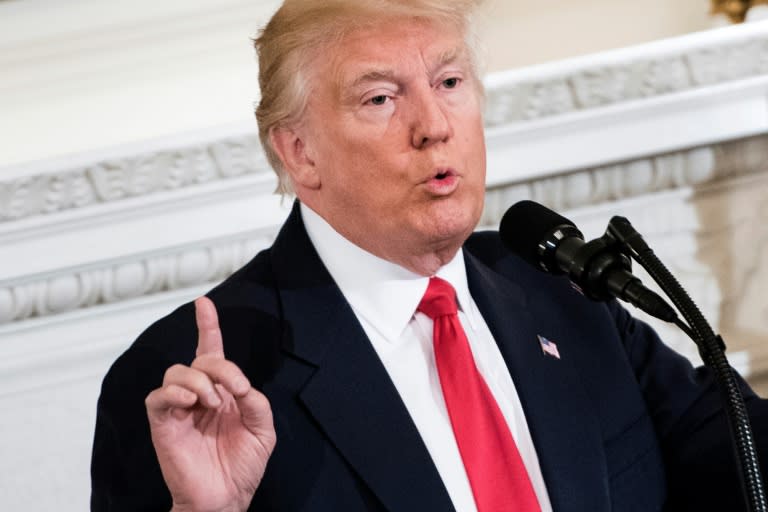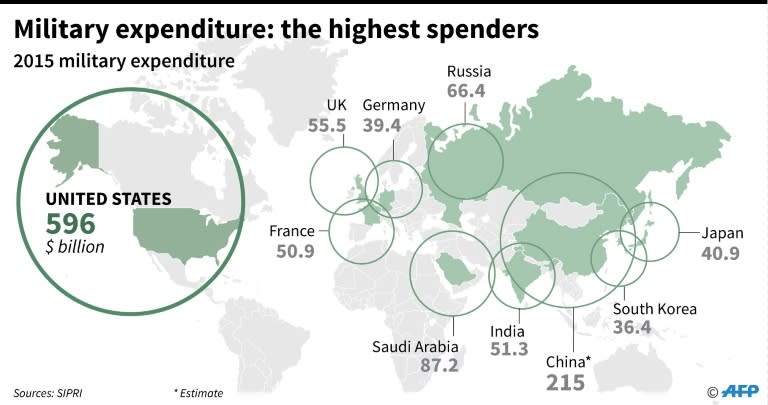Trump to press Congress for defense spending boost
President Donald Trump will address Congress for the first time on Tuesday, selling his policies and laying out the case for a $54 billion boost in military spending and cuts in domestic programs and foreign aid. Previewing measures designed to back up campaign promises with dollars and cents, Trump promised a fiscal plan focused on "public safety and national security." "We are going to spend a lot more money on military. We really have to. We have no choice," Trump said in an interview that aired early Tuesday on Fox News. "A lot of people think it's a tremendous amount of money. It could be actually $30 billion more than that," he said. The proposed $54 billion increase in military spending would swell the US defense budget -- by far the world's largest -- by about 10 percent. To pay for it, administration officials said there would be a corresponding decrease in non-discretionary, non-military programs. "Most federal agencies will see a reduction as a result," an administration official said Monday. There will be a "large reduction in foreign aid," he added, speaking on condition of anonymity. Trump has put security threats front and center of his administration and insisted a blunt, muscular response is the only remedy. He has promised to build a wall on the Mexican border, deport unauthorized immigrants and wipe jihadists off the "face of the earth." His budget proposal -- which must ultimately be approved by Congress -- doubles down on that ethos. The Republican president is set to address the Republican-controlled Congress, in a joint session of the Senate and House of Representatives, shortly after 9:00 pm (0200 GMT Wednesday). The prime-time speech will be nationally televised. - 'Keeping Americans safe' - Trump on Monday claimed his budget "follows through on my promise on keeping Americans safe." "It will include a historic increase in defense spending to rebuild the depleted military of the United States of America at a time we most need it," Trump said. Republican Senator John McCain argued that the increase was less significant than Trump suggested, representing a three percent rise over projections for fiscal year 2018. "We can and must do better," he said. But others raised questions about the impact of planned cuts at the State Department and the Environmental Protection Agency. Foreign aid accounts for less than one percent of US federal spending, and reducing it would not be enough to compensate for a big hike in defense spending. "It is a fairly small part of the discretionary budget, but it is still consistent with what the president said," Trump budget director Mick Mulvaney said. "We are taking his words and turning them into policies and dollars." More than 120 retired admirals and generals -- including retired General David Petraeus, a former CIA director, and retired Admiral James Stavridis, an ex-NATO supreme allied commander -- urged Trump on Monday not to slash spending on diplomacy and development aid. State Department funding is "critical to keeping America safe," the letter to congressional leaders, two cabinet officials and Trump's national security advisor said. - Keystone statement - Trump's address to a joint session of Congress is a crucial agenda-setting moment for new presidents. His initial budget outline did not include proposals for mandatory spending or tax proposals, which make up the bulk of government outlays and receipts. The nearly $4 trillion annual federal budget is a declaration of intent that puts the president's policy goals down in black and white. It also separates affordable campaign promises from the fanciful and is the final arbiter after turf wars between departments and powerful interest groups. Trump has pledged not to cut non-discretionary spending targets, such as costly social-safety nets Social Security and Medicare. Nonetheless, Trump will struggle to sustain promised that spending without worsening the country's national debt, which is set to top $20 trillion on his watch. He has vowed to cut waste and duplication in federal spending. President after president have made similar promises upon coming to office, before delving into a text that runs in the thousands of pages and tossing the plan into the thicket of Congress. Trump has numerous campaign promises to pay for, but faces a deficit at 3.1 percent of gross domestic product, or economic output, and rising. His promises -- from building a wall on the Mexican border to stepping up the deportation of undocumented immigrants -- carry an estimated price tag of $5.3 trillion, according to the non-partisan Committee for a Responsible Federal Budget.





